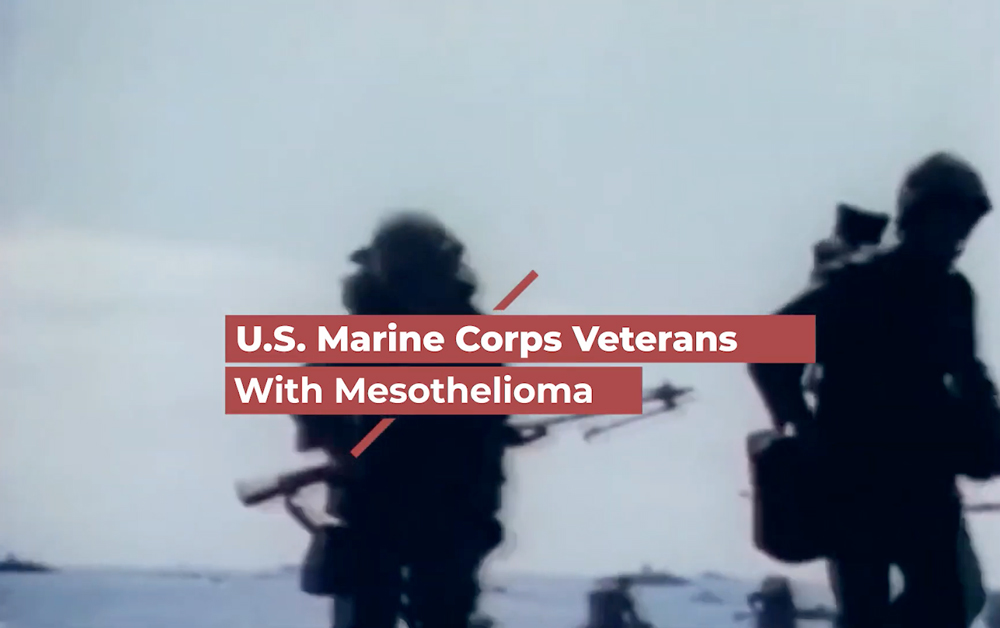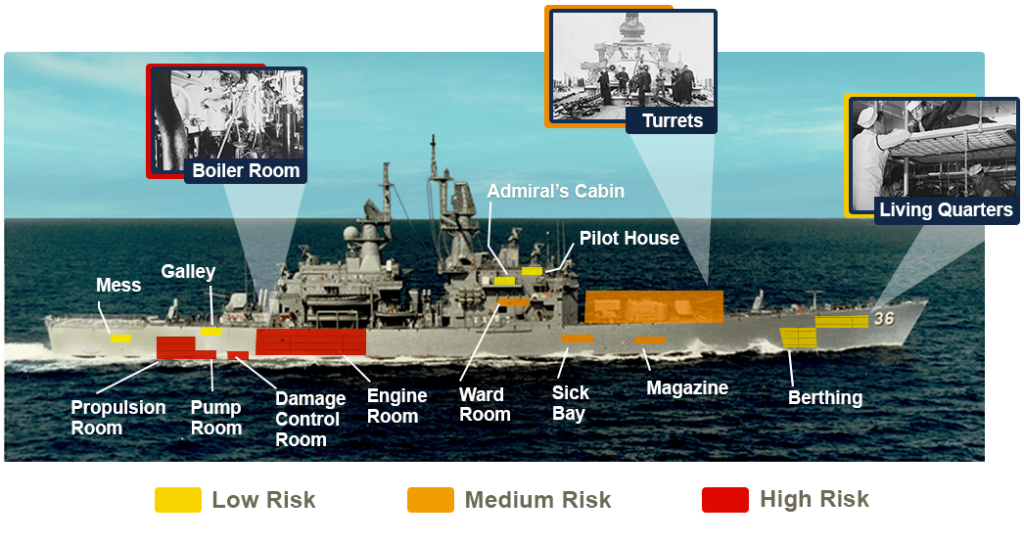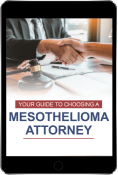United States Marines who served between the 1930s and early 1980s may have been exposed to asbestos. Asbestos is the only known cause of the deadly cancer mesothelioma and was widely used in Marine Corps ships, vehicles, and bases. Thankfully, Marines who develop mesothelioma as a result of their military service can access treatments and compensation from the U.S. Department of Veterans Affairs (VA).
Marine Veterans and Mesothelioma Risks
The U.S. Marine Corps is a small, elite branch of the military that is trained to fight battles in the sea, on the ground, and in the sky. Starting in the early 1930s, the Marine Corps (and all other U.S. military branches) relied on asbestos-based products for decades to help achieve victory.
Video Summary: U.S. Marine Corps veterans are at risk of mesothelioma due to service-related asbestos exposure, but VA benefits and other resources are available to help. View Transcript
Those who served in the United States Marine Corps from the 1930s to the early 1980s may have been exposed to asbestos. Asbestos is a fiber-like mineral known to cause mesothelioma and other cancers.
Asbestos was widely used in Marine Corps ships, vehicles, and bases to make these assets durable, insulated, and heat resistant. Unfortunately, inhaling stray asbestos fibers can lead to mesothelioma later in life.
Mesothelioma is a particularly aggressive form of cancer that can affect the lining of the lungs, heart, testicles, or abdomen. It can take 10-50 years for symptoms of mesothelioma to appear, and unfortunately, there is no cure.
Thankfully, If you're a Marine Corps veteran who has been diagnosed with mesothelioma as a result of your military service, there are ways to get help.
The U.S. Department of Veterans Affairs offers many benefits to veterans with mesothelioma, like medical treatments, monthly compensation, financial assistance for loved ones, and much more.
You served your country honorably, and the VA is here to support you in return.
Marine Corps veterans may also qualify for private compensation from a mesothelioma claim. Filing a claim won’t affect your ability to get VA benefits, and you won’t be taking legal action against the military.
If you have been diagnosed with mesothelioma and served in the U.S. Marine Corps, reach out to the Mesothelioma Veterans Center today. We are dedicated to helping you get VA benefits, life-changing treatment, and financial aid.
Asbestos is a highly durable mineral made up of tiny fibers that resists heat, corrosion, and sound. Initially, the U.S. government thought that asbestos-based products, like construction materials, were safe since manufacturers hid the facts.
Asbestos could be found in Marine Corps:
- Aircraft
- Barracks and other buildings
- Cars and trucks
- Ships
- Weapons
However, asbestos is now known to cause a life-threatening cancer called mesothelioma and other deadly illnesses. Marine Corps veterans whose Military Occupational Specialties (MOS) were in construction often have the highest risk of developing mesothelioma, but any veteran exposed to asbestos is at risk.
The VA offers financial and medical benefits to veterans with mesothelioma. Private compensation may also be available for Marines with mesothelioma or other asbestos-related diseases.
History of Marine Veterans and Asbestos Risks
Since asbestos use was so widespread between the 1930s and early 1980s, Marines may have been exposed in several ways. See how the Marine Corps relied on asbestos below.
Barracks
Dozens of Marine Corps bases and barracks used asbestos. The barracks were often lined with asbestos insulation to fireproof them. This was typical of the military before the dangers of asbestos were known. Asbestos-containing materials like pipes and gaskets also were used to build Marine bases, barracks, and other buildings.
Notable Marine Corps bases that used asbestos included Camp Lejeune in North Carolina, Camp Pendleton in California, and Naval Station Newport in Rhode Island.
Asbestos products could be found in the following locations:
- Ceiling tiles
- Doors
- Floor tiles
- Heating systems
- Insulation
- Piping
- Roofing materials
As the materials wore down over time or were removed during maintenance, it was easier for asbestos exposure to occur.
Marines with the highest risk of asbestos exposure were the ones that built or repaired barracks. These Marines had to handle materials made from asbestos, and as these products were disturbed, asbestos fibers were released into the air.
Ships
Marine corps veterans who served aboard U.S. Navy vessels also have a higher risk of developing mesothelioma and other asbestos-related illnesses than those who didn’t, as virtually every ship was built with asbestos between the 1930s and early 1980s.
Marines working on Navy ships could have been exposed to asbestos at every turn.
Asbestos exposure was a risk whenever someone worked on:
- Bulkheads
- Boilers
- Cables
- Ceiling tiles
- Deck flooring
- Engines
- Gaskets
- Insulation
- Pipes
- Valves
When asbestos on Navy ships was disturbed, it could remain airborne for hours and anyone aboard could easily inhale it. The risk was particularly high in boiler rooms and engine rooms, which had extremely poor ventilation.
Asbestos could also be carried to other areas of the ship on someone’s skin, hair, or clothing after initial exposure.
Shipyards
Throughout most of the 20th century, Marine corps working in shipyards were also at high risk for asbestos exposure.
Before the 1980s, ship parts like incinerators and boilers were lined with asbestos insulation to protect them from fires and excessive heat. As Marines installed, repaired, or replaced these components, asbestos fibers were released and possibly inhaled.
Actor and U.S. Marine Corps veteran Steve McQueen believed he developed mesothelioma from removing asbestos insulation in a Navy shipyard.
The military’s largest shipyards were in California, New York, Washington, Virginia, and Oregon. Asbestos-containing products were still being used in Navy ships until the early 1980s.
Call (877) 450-8973 to get help if you or a loved one developed mesothelioma after serving in the U.S. Marine Corps.
Vehicles
Tanks and other motor transport vehicles used by the Marines contained asbestos. In the 1960s, the Marines used the M60 Patton tank, which contained asbestos insulation for fireproofing. Gunners operating the tank also wore gloves lined with asbestos to protect them from burns.
Transport vehicles, all-terrain vehicles, and amphibious assault vehicles all had similar asbestos risks. As the insulation in these vehicles wore down, the asbestos exposure risk increased.
Marines working as mechanics on aircraft or transport vehicles also had a high risk of asbestos exposure. These Marines often came in contact with seals, gaskets, brake pads, and clutches made with asbestos.
Secondary Asbestos Exposure and the Marine Corps


Marine Corps veterans are not the only ones who may be at risk of developing mesothelioma today. If their family members lived on a Marine Corps base where asbestos materials were used, they may have been exposed indirectly.
If asbestos fibers were disturbed as a Marine worked, they could get stuck on uniforms, hair, or skin. Family members who hugged their loved ones or handled these uniforms could have unknowingly been exposed to asbestos fibers.
Marines and Modern-Day Asbestos Risks
According to the VA, while it is very rare, some active-duty Marine corps may be exposed to asbestos while overseas in Iraq or nearby countries. Older buildings in this region that used asbestos in their construction can become damaged and release asbestos into the air.
Get a Veterans Packet to learn more about the risks of asbestos exposure.
VA Benefits and Compensation for Marine Corps Veterans
There are many VA benefits and private forms of compensation available that can ease the burden of living with mesothelioma. Learn how to access these benefits below.
Mesothelioma and Marines: Get Help Now
Brave and proud Marine Corps veterans should never have been put at risk of asbestos exposure and mesothelioma, but private corporations only thought of the profits.
They put millions of U.S. service members in harm's way — and each year, thousands of veterans are diagnosed with mesothelioma as a result.
At Mesothelioma Veterans Center, we're here to help U.S. Marine Corps veterans, families, and civilians navigate life after a mesothelioma diagnosis.
Here are 4 steps we suggest to Marine Corps veterans with mesothelioma:
- Call (877) 450-8973 to find out your eligibility
- If you qualify, work with our team to file for or increase your VA benefits
- Find top doctors near you who can treat you with help from our registered nurses
- Pursue compensation by working with our partner attorneys
Learn about all the ways we can help you with our Free Veterans Packet.
Mesothelioma and Marines FAQs
Why do Marine Corps veterans get mesothelioma?
U.S. Marine Corps veterans are at a high risk of mesothelioma if they served before the early 1980s. This is because the U.S. Marine Corps used asbestos in bases, barracks, vehicles, and ships up until this time.
It typically takes 10-50 years after asbestos exposure before symptoms of mesothelioma appear, which is why veterans are only now just getting sick.
The deadly risks of asbestos exposure were hidden by makers of asbestos-based products, who put profits ahead of human life.
Is asbestos still used by the U.S. Marine Corps?
The Marines do not use asbestos in any new buildings, ships, or other assets. However, older military structures may still contain asbestos even today.
Though steps were taken to remove most of the asbestos found on older military bases and ships, it was simply impossible to remove it all as too much had been used.
What is the VA disability rating for mesothelioma?
The VA rates almost all cases of service-conneccted mesothelioma as a 100% disability. This means veterans of the U.S. Marine Corps and other military branches can get the highest disability payouts and lowest health care premiums.
Our team can help you increase your disability rating to 100% if you have mesothelioma and were exposed to asbestos while serving in the military. Get started now by calling (877) 450-8973.
Can veterans get compensation for asbestos?
Yes, U.S. Marine Corps veterans can get compensation if asbestos caused them to develop mesothelioma.
One main way to get compensation is by filing for VA disability compensation, which can award almost $4,000 a month in many cases.
Marines can also pursue additional compensation through asbestos trust fund claims and lawsuits. These claims can bring in life-changing money and won't affect a veteran's ability to file for VA benefits.






